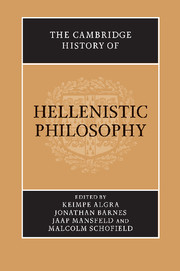Book contents
- Frontmatter
- PART I INTRODUCTION
- PART II LOGIC AND LANGUAGE
- PART III EPISTEMOLOGY
- PART IV PHYSICS AND METAPHYSICS
- 11 Hellenistic physics and metaphysics
- 12 Cosmology
- 13 Theology
- 14 Explanation and causation
- 15 Determinism and indeterminism
- 16 Epicurean psychology
- 17 Stoic psychology
- 18 Philosophy, science and medicine
- PART V ETHICS AND POLITICS
- Synopsis of principal events
- Editions of sources and fragments
- List of abbreviations
- Bibliography
- Index locorum
- General Index
- References
13 - Theology
from PART IV - PHYSICS AND METAPHYSICS
Published online by Cambridge University Press: 28 March 2008
- Frontmatter
- PART I INTRODUCTION
- PART II LOGIC AND LANGUAGE
- PART III EPISTEMOLOGY
- PART IV PHYSICS AND METAPHYSICS
- 11 Hellenistic physics and metaphysics
- 12 Cosmology
- 13 Theology
- 14 Explanation and causation
- 15 Determinism and indeterminism
- 16 Epicurean psychology
- 17 Stoic psychology
- 18 Philosophy, science and medicine
- PART V ETHICS AND POLITICS
- Synopsis of principal events
- Editions of sources and fragments
- List of abbreviations
- Bibliography
- Index locorum
- General Index
- References
Summary
Philosophical theology
Though theology without some form of religion to prompt it would be an odd phenomenon, it is by no means the same thing as religion. Theology, or at least philosophical theology, is a rational enterprise or at any rate an attempt to rationalize the irrational. Rationalist forms of reflection concerning the gods, or the divine, are part of Greek philosophy from its very beginning. On the one hand, the primary principle or principles were often said to be divine or provided with divine attributes, while on the other traditional views of the gods were criticized and other proposals formulated. But the first philosopher to elevate theology (at least in principle) to the status of a part of philosophy was Aristotle, who at Metaph. E 1.1026a19 affirms that there are ‘three theoretical disciplines: mathematics, physics, theology’. Before Aristotle, Plato had argued that those who write about the gods should follow certain ‘models’ (Rep. 379a6). According to this prescription, a god is good and so not the cause of evil but only of what is good, and he does not change but always remains the same. The sharp contrast with the gods of traditional Greek religion, who assume different shapes at will and may not only favour human beings but also deceive and harm them, is very deliberate.
Divinities which conform to this ideal play a decisive part in Plato's and Aristotle's cosmologies. According to Plato's Timaeus we live in the best of all possible worlds because it has been constructed by a Divine Craftsman and his help-mates.
- Type
- Chapter
- Information
- The Cambridge History of Hellenistic Philosophy , pp. 452 - 478Publisher: Cambridge University PressPrint publication year: 1999
References
- 23
- Cited by

